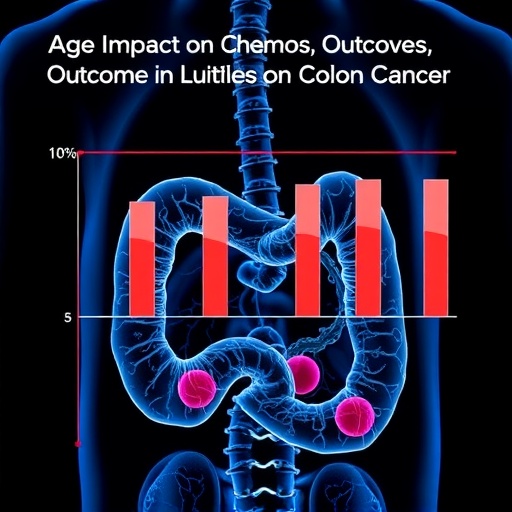In a groundbreaking retrospective cohort study published recently in BMC Cancer, researchers have unveiled critical insights into how age shapes the administration and outcomes of adjuvant chemotherapy in patients diagnosed with stage II colon cancer. Despite the known ambiguities surrounding the benefit of such treatments in this specific cancer stage, the study sheds light on an age-related divergence in clinical decision-making and patient response, promising to recalibrate treatment paradigms moving forward.
The investigation meticulously analyzed data from a broad cohort of patients who underwent radical surgery for colon cancer between 2013 and 2018. These patients were categorized into three distinct age groups: young adults aged 18 to 49, middle-aged adults from 50 to 64, and older adults aged 65 to 75. By stratifying patients this way, the researchers aimed to dissect variance in adjuvant chemotherapy utilization and survival outcomes linked directly to age demographics.
One of the pivotal findings revealed a stark contrast in the prevalence of comorbidities among the age groups. Younger patients exhibited significantly fewer additional health conditions compared to their middle-aged and older counterparts. This finding could suggest that younger patients are generally healthier and potentially better equipped to tolerate aggressive oncologic treatments, an observation with substantive implications for therapeutic strategies.
Pathological examination highlighted a higher incidence of poorly differentiated tumor types in the younger cohort, a detail that complicates the picture. Poor tumor differentiation typically correlates with more aggressive cancer behavior and might justify a more intensive treatment approach, which aligns with the observed higher rates of adjuvant chemotherapy in younger patients.
Furthermore, young patients demonstrated a notably increased frequency of microsatellite instability-high (MSI-H) status, a molecular marker often associated with a better prognosis and a distinctive tumor biology that may influence responses to chemotherapy. This molecular characteristic adds a layer of complexity to treatment decisions and prognostic predictions in this subgroup.
Statistical analysis indicated that both young and middle-aged patients had significantly greater odds of receiving adjuvant chemotherapy compared to older patients. Specifically, the odds ratio for young patients receiving treatment was more than four times that of older adults. Such disparities point to potential biases or clinical considerations tied to age that merit further scrutiny for equitable care delivery.
Not only were younger patients more likely to receive chemotherapy, but they also tended to be treated with more aggressive, multi-drug regimens. This trend suggests a clinical inclination towards maximal treatment intensity in those perceived as biologically more resilient, highlighting the intersection of patient age, treatment intensity, and therapeutic goals.
Perhaps most strikingly, despite these differences in treatment patterns and regimen intensity, survival outcomes did not significantly differ among age groups when comparing patients who underwent surgery alone versus those who received adjuvant chemotherapy. This absence of a survival advantage calls into question the utility of more aggressive chemotherapy in younger populations within the stage II colon cancer context.
The study’s results provoke a critical reevaluation of adjuvant chemotherapy’s role in stage II colon cancer, especially given the lack of observed survival benefits relative to the additional toxicity and risks associated with chemotherapy, particularly in younger patients. This underscores the need for precise biomarkers and refined clinical criteria to guide therapy.
Moreover, these findings emphasize the importance of individualized treatment planning, where the decision to administer adjuvant chemotherapy is informed not only by age but also by tumor biology, patient comorbidities, and potential quality-of-life outcomes. Age alone may be an insufficient criterion for dictating treatment intensity.
The observed molecular differences, including increased MSI-H status among younger patients, may open avenues for tailored therapeutic approaches such as immunotherapy, which has shown promise in MSI-H tumors, potentially supplanting or supplementing traditional chemotherapy in select populations.
Clinicians are thereby encouraged to adopt a multidisciplinary approach, integrating molecular diagnostics, comprehensive patient health evaluations, and patient preferences to optimize treatment decisions. This paradigm shift could minimize overtreatment and associated harms while maximizing clinical benefits.
This research also paves the way for prospective studies to validate these retrospective observations and to explore interventions tailored to biologically and clinically meaningful patient subgroups. Such work could ultimately establish evidence-based guidelines that transcend age-based assumptions.
As colon cancer incidence patterns continue to evolve globally, understanding how age intersects with tumor biology and treatment response becomes increasingly vital. This study marks a significant step toward more nuanced and effective patient-centered care in oncology.
In summary, the evidence accruing from this large-scale analysis calls for critical introspection of current chemotherapy use patterns in stage II colon cancer. It highlights an urgent need to reconcile aggressive treatment approaches with actual survival benefits, particularly among younger individuals whose tumor biology may inherently differ yet whose survival gains from chemotherapy remain uncertain.
This research not only challenges existing clinical dogma but also reinforces the importance of personalized medicine approaches in oncology. By aligning therapeutic intensity with individual patient profiles and tumor characteristics, the oncology community can aspire to deliver more rational, effective, and compassionate care.
The full impact of this study is yet to be realized. Still, its revelations promise to stimulate vital dialogue among oncologists, patients, and policymakers, driving improvements in cancer treatment frameworks and ultimately enhancing survival and quality of life for patients across all ages.
Subject of Research: Age-related differences in the use and outcomes of adjuvant chemotherapy in stage II colon cancer patients.
Article Title: Age-related differences in adjuvant chemotherapy use and outcomes in stage II colon cancer: a retrospective cohort study.
Article References:
Zhou, Q., Zhou, C., Zhang, G. et al. Age-related differences in adjuvant chemotherapy use and outcomes in stage II colon cancer: a retrospective cohort study. BMC Cancer 25, 1527 (2025). https://doi.org/10.1186/s12885-025-14848-9
Image Credits: Scienmag.com




